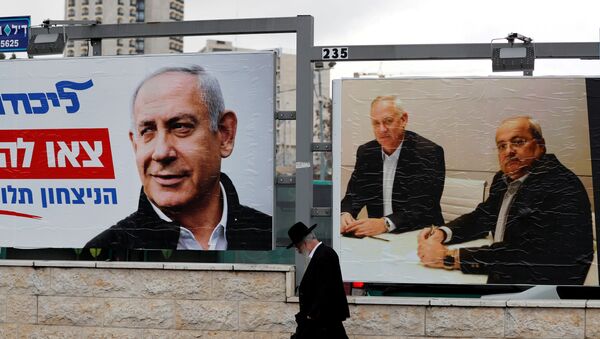Although the Jewish state had the right to implement the plan "immediately", Netanyahu decided against the move, waiting for elections, set for early March. The PM hopes for a decisive victory in the upcoming polls which will enable him to form a stable right-wing government and that in turn would let him pass the necessary legislation regarding Washington's "deal of the century" plan.
Eyeing With Concern
Amman, being the custodian of Jerusalem's holy sites and home to a large Palestinian community that makes up some 69 percent of Jordan's total population, is sensitive to changes in the West Bank and Jerusalem, and is watching the race for Israel's premiership with concern.
In January, talking to France 24, the Jordanian monarch stated that due to Israel's focus on domestic issues relations between the two states have been "on pause for the past two years" and expressed hope the Jewish state would succeed in electing a lasting government in March to increase stability in the region.
"Although we have faced problems with Israel on a number of issues, at the end of the day we are dealing with a state, regardless of who is in charge. We will be working with whoever comes to power, be it the right or the left", Abdallah Sawalha, the founder and director of the Centre for Israel Studies based in Amman says.
Jordan signed a peace treaty with Israel in 1994 that proved to be stable despite Amman's frustration over the stagnation in the Israeli-Palestinian peace process, the tensions around Israel's activity on the Temple Mount, and the more recent spat over two swathes of land: Tzofar and Naharayim reclaimed by the Jordanians after a lease contract of these territories expired in 2019.
Jordan as Mediator
Sawalha believes that the peace agreement will also withstand the US peace initiative, despite the anti-Israel sentiment that it stirred up.
Right after the plan was announced, thousands of Jordanians took to the streets of the country's capital to vent their anger at the initiative chanting anti-Israel and anti-American slogans and setting fire to the Israeli flag.
Despite the protests and the objection of politicians, professional unions and the media, the Jordanian monarch "swallowed" the Israeli-American initiative, says Abdallah Sawalha, simply because he thought "the plan presented an opportunity for the two sides to achieve peace".
But there is much more to it. According to the US State Department, Washington is Jordan's single largest provider of bilateral assistance giving over $1.7 billion in 2017, including $1.3 billion in bilateral foreign assistance and $200 million in military aid.
The two countries also benefit from an extensive economic partnership, with the US being Jordan's largest trade partner.
That's why "Jordan is taking a more delicate approach, maximising the gains and minimising the losses", says Sawalha.
"We can use our [close] position [with the US] to convince the Americans that any unilateral steps will harm the stability of the region. We can initiate a serious dialogue between all the sides because if we don't, those who will suffer most will be the Palestinians", he concluded.



